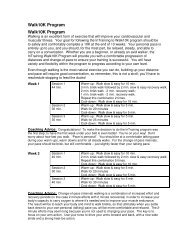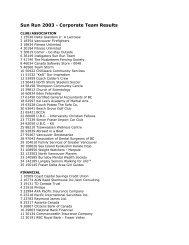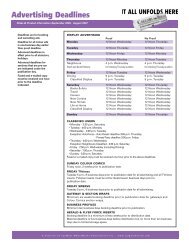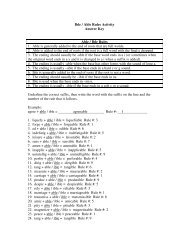Toivanen v. Electronic Arts (Canada) Inc. (No. 2 ... - Canada.com
Toivanen v. Electronic Arts (Canada) Inc. (No. 2 ... - Canada.com
Toivanen v. Electronic Arts (Canada) Inc. (No. 2 ... - Canada.com
You also want an ePaper? Increase the reach of your titles
YUMPU automatically turns print PDFs into web optimized ePapers that Google loves.
Work is one of the most fundamental aspects in a<br />
person’s life, providing the individual with a means of<br />
financial support and, as importantly, a contributory role<br />
in society. A person’s employment is an essential<br />
<strong>com</strong>ponent of his or her sense of identity, self-worth and<br />
emotional well being.<br />
Thus, for most people, work is one of the defining features of their lives.<br />
Accordingly, any change in a person’s employment status is bound to have<br />
far-reaching repercussions. In “Aggravated Damages and the Employment<br />
Contract”, supra, Schai noted at p. 346 that, “[w]hen this change is<br />
involuntary, the extent of our personal dislocation is even greater.<br />
The point at which the employment relationship ruptures is the time when<br />
the employee is most vulnerable and hence, most in need of protection. In<br />
recognition of this need, the law ought to encourage conduct that<br />
minimizes the damage and dislocation (both economic and personal) that<br />
result from dismissal. In Machtinger, supra, it was noted that the manner<br />
in which employment can be terminated is equally important to an<br />
individual’s identity as the work itself. (at paras. 93 to 95)<br />
[132] Ms. <strong>Toivanen</strong>’s career was her life. EA expected that level of <strong>com</strong>mitment from<br />
its employees. Particularly during “crunch time” she worked seven days a week and<br />
sometimes until 3, 4, or 5 a.m. She didn’t keep in touch with friends and if she had time<br />
off, she slept. Even outside of “crunch time” Ms. <strong>Toivanen</strong> put all her time and energy<br />
into her job. She was so dedicated that she did not follow Dr. Rode’s advice in August<br />
2002, at the risk of her health. Ms. <strong>Toivanen</strong> was so worried that if she took time off<br />
work, EA would view her negatively. When she finally got the courage to hand in her<br />
doctor’s note on September 4, 2002, indicating she required time off, she had expected<br />
EA to “step up to the plate” and repay her for all her hard work and dedication by<br />
supporting her need for time off. Instead, it dismissed her.<br />
[133] Ms. <strong>Toivanen</strong> said that when she got the letter of termination it blew her world<br />
apart. She was going through one of the worst emotional and physical challenges that she<br />
had ever experienced. As well, personally, it was a huge challenge for her, at 47, to have<br />
to return to Alberta and live with her parents, in a one bedroom apartment in a senior<br />
citizen’s <strong>com</strong>plex, when she was used to living on her own in her West End apartment.<br />
However, she was unable to cope on her own and had no choice.<br />
34
















